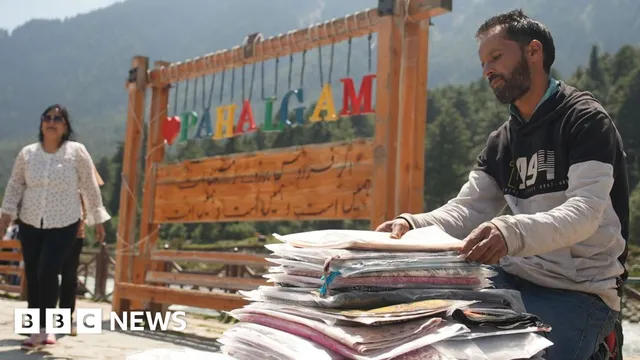
Macron condemns terrorist attack in Pahalgam, stands with India
2025-04-28 21:10- A terrorist attack in Pahalgam, Jammu and Kashmir resulted in the deaths of 26 individuals, including innocent civilians.
- French President Emmanuel Macron expressed solidarity with India and condemned the act during a call with Prime Minister Narendra Modi.
- The Indian government implemented various diplomatic measures against Pakistan in response to the attack, highlighting the seriousness of the situation.
Express your sentiment!
Insights
On Tuesday, a horrific terrorist attack occurred in Pahalgam, Jammu and Kashmir, claiming the lives of 26 individuals, including innocent civilians. The attack has generated widespread outrage across India, prompting various responses both domestically and internationally. In a show of solidarity, French President Emmanuel Macron reached out to Indian Prime Minister Narendra Modi, offering personal condolences and reinforcing that France stands firmly with India during this grievous time. He strongly condemned the attack and reiterated the continued commitment to combat terrorism alongside allies. In response to the violence, India enacted several diplomatic measures against Pakistan, including suspending the Indus Waters Treaty, closing the Integrated Check Post at Attari, and imposing limitations on Pakistani nationals regarding the SAARC Visa Exemption Scheme. This situation has escalated tensions between India and Pakistan, with growing calls within India for stricter actions against its neighbor, reflecting a sense of collective grief and the need for a decisive response to such acts of terrorism. Additionally, the Jammu and Kashmir Assembly passed a resolution condemning the attack, highlighting the values of unity and harmony in the region, and recognizing the heroism of individuals who lost their lives while trying to protect others during the chaos erupted due to the attack.
Contexts
The historical context of India-Pakistan relations is marked by a complex interplay of political, social, and religious factors that have shaped the trajectory of interactions between the two nations since their independence in 1947. The partition of British India into two separate states—Hindu-majority India and Muslim-majority Pakistan—was accompanied by massive communal violence and the displacement of millions. This traumatic event laid the foundation for deep-seated animosities, as both countries emerged from the colonial experience with a mix of aspirations and grievances. The initial years saw conflict over territories like Jammu and Kashmir, leading to the first Indo-Pakistani War in 1947-48, which set a precedent for the contentious nature of their relationship, characterized by hostility, military confrontations, and diplomatic standoffs. Over the decades, multiple wars, including the 1965 war and the 1971 conflict that led to the creation of Bangladesh, further cemented the adversarial stance of both nations. The underlying issues surrounding Kashmir continued to be a flashpoint, with Pakistan's support for insurgency in Indian-administered Kashmir exacerbating tensions. Additionally, the development of nuclear capabilities by both countries in the late 20th century added a new dimension to their rivalry, instilling a sense of urgency in international diplomacy to prevent military escalation. The 1998 nuclear tests conducted by both nations not only showcased their military prowess but also underscored the existential stakes involved, leading to a precarious balance of power that continues to influence regional dynamics. In the late 20th and early 21st centuries, various attempts at peace talks have been made, with moments of thawing relations juxtaposed against significant setbacks, often related to terrorism, military skirmishes, and political maneuvering. Initiatives such as the Lahore Declaration in 1999 and back-channel communications have occasionally offered hope for improved ties, yet challenges persist. The role of external actors, including the United States and China, has further complicated the bilateral relationship, impacting their diplomatic strategies and national security policies. The growing economic interdependence between the countries in certain areas, despite the overarching adversarial relationship, has led to a nuanced discourse on cooperation stemming from shared challenges such as terrorism and climate change. Today, the historical context informs not only political decisions but also how societies in Pakistan and India perceive each other. National narratives in both countries are heavily influenced by the legacy of colonialism, the trauma of partition, and ongoing conflicts. With increasing calls for dialogue from civil society, the question remains whether reconciliation is achievable in a landscape marked by historical grievances and contemporary geopolitical shifts. As we move forward, understanding the intricate history of India-Pakistan relations is crucial, as it not only shapes the regional order of South Asia but also holds implications for global security and diplomacy.